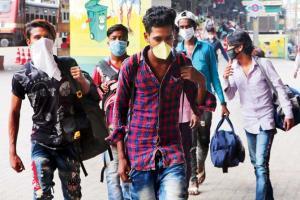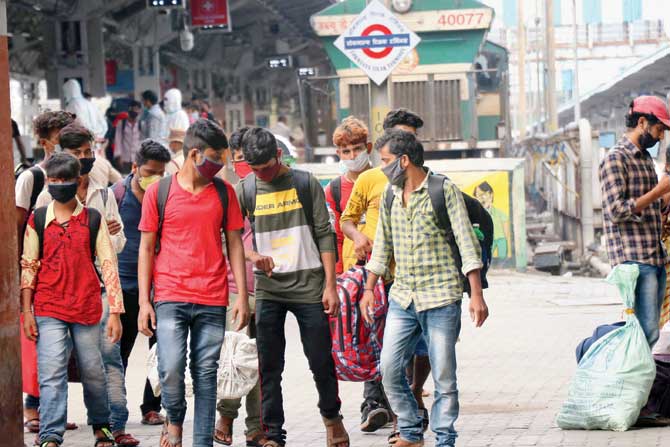57 per cent see loss of jobs in family due to lockdown, 37 per cent have big debts, and less than 30 per cent received relief from state

A file picture of migrants returning at LTT. PIC/Rajesh Gupta
The lockdown during the pandemic affected the livelihood of lakhs of migrant workers and daily wage labourers, and despite the initiatives taken by the state and central governments, many haven't had access to the benefits. The findings of a recent study on the status of the urban poor by Save The Children, India (STCI), a non-profit organisation, indicated that less than 30 per cent of the participants received relief in the form of ration, and only 4 per cent got cash transfers.
ADVERTISEMENT
The survey, that was conducted last month, involved the responses of 1,703 participants from Mumbai, Navi Mumbai, Pune and New Delhi (986 participants were from MMR) from the marginalised sections of society. While 40 per cent of the participants were daily wage workers, 42 per cent worked in the informal sector (drivers, house help, cooks) and the rest work in private companies and government departments. All the participants were in a financially vulnerable state prior to the pandemic, and the extended lockdown has increased their food and cash insecurity.
'Not adequate to survive'
For 57 per cent of the participants, at least one person in their families lost their job in the lockdown and majority had a single earning member. Over 50% of the participants have dipped into their meagre savings and in the absence of a steady income, 37 per cent of the participants are already in debt. Lack of sufficient food continues to be their biggest worry, and the study indicated that though 60 per cent of the participants have a ration card and 88 per cent have at least one bank account in the family, only 29 per cent of the participants have received ration while only 4 per cent have received cash transfers.

Some migrants who returned to the city in the lockdown. Representation pic/Rajesh Gupta
Apart from the government, various corporate organisations had also allocated funds to help the urban poor. Despite all the relief measures, close to 71% of the participants said what they received from the state and the corporate sector was not adequate to survive the pandemic.
'50% participants in debt'
Havovi Wadia, chief executive officer with STCI pointed out that there is a huge gap between the supply and the demand when it comes to relief material. "In Mumbai, 40-50 per cent of the participants are already in debt and as the lockdown extends, this will only set them up for exploitation. There is a system for relief work in place and even though people have the necessary documents, the supply isn't reaching them possibly because the people responsible don't know the population well. Perhaps with increased involvement of NGOs, that gap can be bridged," she said.
Wadia said that other NGOs should carry out similar surveys to get a better understanding of the population. She said that they are in the process of compiling a report of the findings and will submit the same to the civic body as well as state authorities soon.
To deal with the issue, STCI recommended that cash transfers should be given for at least three months along with food supply to reduce further financial instability. STCI also suggested implementing a customised system of loans for the urban poor that are low cost with options of flexible repayment. Another recommendation involved efforts that can be taken at a state level to create COVID-19-safe livelihood options for the urban poor to earn minimum wage in the near future.
Catch up on all the latest Crime, National, International and Hatke news here. Also download the new mid-day Android and iOS apps to get latest updates.
Mid-Day is now on Telegram. Click here to join our channel (@middayinfomedialtd) and stay updated with the latest news
 Subscribe today by clicking the link and stay updated with the latest news!" Click here!
Subscribe today by clicking the link and stay updated with the latest news!" Click here!






